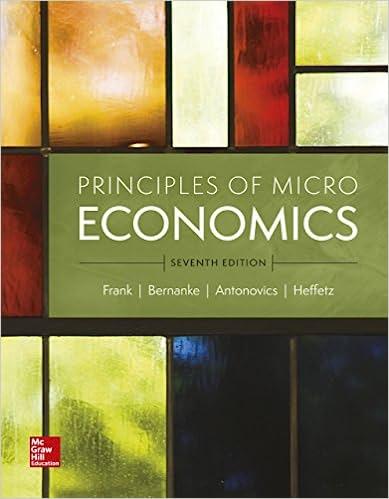Question
1) Elinor Ostrom was born in Los Angeles during: a, the Great Recession. b. World War II. c, the Great Depression. d, World War I.
1) Elinor Ostrom was born in Los Angeles during:
a, the Great Recession.
b. World War II.
c, the Great Depression.
d, World War I.
2) Ostrom's view of the world was influenced by the principles of:
a, cooperation and resource conservation.
b, cooperation and socialism.
c, economic depression and resource conservation.
d, economic depression and socialism.
3) Elinor Ostrom's most significant contribution to economics was to disprove:
a, all of it.
b, the association of "cooperation" with "socialism."
c, the microeconomic foundations of macroeconomics.
d, the tragedy of the commons.
4) The reality that the common ownership of important resources can lead to excessive exploitation is known as the:
a, tragedy of the commons.
b, Great Depression.
c, tragedy of cooperation.
d, principle of resource conservation.
5) If the tragedy of the commons holds true, then fishermen will tend to:
a, overfish a privately owned pond because they do not understand economic theory.
b, overfish a privately owned pond out of fear that other fishermen will sneak in and do the same.
c, overfish a common pond because they assume all other fishermen will assume it has no fish.
d, overfish a common pond out of fear that other fishermen will do the same.
6) Elinor Ostrom became used to being a contrarian in part because of the struggles she faced as a woman in economics. Which of the following is the best definition of a contrarian?
a. a person who works in a field that is not traditional for their gender
b, a person who rejects or opposes the majority opinion
c, a person who does things just to cause trouble
d, a person who shows a dogged determination not to change their opinion
7) Elinor Ostrom's approach to studying the tragedy of the commons was a:
a, theoretical approach, which is atypical in economics.
b, theoretical approach, which at the time was fashionable in economics.
c, case-study approach, which at the time was fashionable in economics.
d, case-study approach, which is atypical in economics.
8) In her travels, Ostrom observed that:
a, people self-organize a wide diversity of common property institutions and sometimes solve problems very well.
b, people self-organize a wide diversity of private property institutions, but seldom solve common resource problems very well.
c, people adopt a wide diversity of centrally organized common property solutions, but they lead to common resource problems.
d, people adopt a wide diversity of centrally organized private property solutions, and they sometimes solve problems very well.
9) Professor Cowen does NOT mention Elinor Ostrom collaborating with experts in which of these disciplines?
a, psychology
b, ecology
c, political science
d, computer science
10) Which of the following is NOT true about Elinor Ostrom?
a, She was the first woman to win the Nobel Prize in economics.
b, She was very pessimistic about the future of the environment.
c, She is among the most-cited economists.
d, She proved that group norms, worked out at the local level, could solve environmental problems.
Please i'll be glad to get answers. Thanks
Step by Step Solution
There are 3 Steps involved in it
Step: 1

Get Instant Access to Expert-Tailored Solutions
See step-by-step solutions with expert insights and AI powered tools for academic success
Step: 2

Step: 3

Ace Your Homework with AI
Get the answers you need in no time with our AI-driven, step-by-step assistance
Get Started


